- Home
- Melissa Marr
Carnival of Souls cos-1 Page 2
Carnival of Souls cos-1 Read online
Page 2
“I won’t,” she promised. The pressure around her chest faded.
He held the 9mm pistol out to her.
Lips pursed, she accepted it. Daimons might be more capable at hand-to-hand, but she wasn’t planning on allowing any of them close enough for that to matter.
“Empty it,” he ordered.
Mallory aimed and emptied half the clip. After fifteen bullets tore through the existing holes in the target, daylight shone through the center of the paper as if it were an open window. She did the same thing to a second target, and then lowered the gun. Maybe if she was good enough, her father would let her take a little time to go out, to at least build a friendship with Kaleb instead of settling for a few moments when they crossed paths. She glanced at Adam.
He nodded. “Again.”
SEVERAL HOURS AND SEVERAL clips later, Adam and Mallory returned to the three-bedroom house they rented in Smithfield, yet another of the interchangeable towns in the middle of the country. Like almost every other house the past few years, this one was nondescript. It was nice, clean, and in good order, but it was anonymous in a way she sometimes hated. The walls were white, and the carpets were beige. There were no houseplants or bric-a-brac that said “this is a home.” Takeout menus were held to the front of the fridge by strips of tape, clips, and magnets. It added to the already generic feel of the house.
It had been five years since they’d had a real home.
Since Mom left.
That was the real difference: Selah had turned whatever rental they’d had into an actual home. She’d bought paint and rollers, and she’d spent days turning a plain house into a real home. Boring white walls became a different color in each house. “Make it an adventure,” she’d said. One house had ceilings painted like a sky, blue with big, fluffy clouds. Another had a tree painted on Mallory’s bedroom wall. Selah had added hooks for her robe and her coat at the ends of two big branches. Beige carpet was covered with rugs, the splashes of color Selah pulled from battered boxes to make boring space into flower-strewn fields or calm ponds. Claiming a house was a game, one they’d played over and over in new towns. Now that it was just Mallory and Adam, the walls of every house were white, and the only color on the carpet was from the stains left by the last residents.
Mallory walked into the dining room and sat down. Mutely, she put both guns on the weathered wooden table, and then she proceeded to wipe down first her.357 and then the 9mm. She’d been handling guns since she was seven, and the process — much like the routine of aiming and discharging her weapons — was reassuring. It was a cue that things were normal, that her life was unchanged even as the houses she slept in year after year changed.
“We have to move again,” Adam said from the doorway to the dining room.
She paused. “When?”
“Now.” His mouth was a grim line.
“Now,” she repeated. “Like tonight, now?”
“No.” He gave her a smile that did little to soften the tension in his expression before saying gently, “I called the company movers. They’ll be here on the fifteenth.”
Childish hurt warred with years of practicality. Adam wouldn’t decide that they needed to go again, especially on such short notice, if he didn’t think it was essential, but she felt betrayed. They’d spent hours together, and he hadn’t mentioned it until now.
“That’s my birthday,” she said with as little inflection as she could manage. She didn’t—couldn’t—mention Kaleb, but the thought of never seeing him again tore at her. Her gaze was carefully fixed on the gun she wiped clean.
“I know.” Adam walked into the room and hugged her. “I’m sorry.”
She closed her eyes like the child she couldn’t be. It was silly to make a big deal over a date on the calendar, but she still clung to the foolish dream that her mother would show up on her birthday. There was no reason to believe she would, but Mallory had held on to the hope that her mother would walk back through the door and into their lives some birthday with as little notice as her departure on Mallory’s twelfth birthday.
Adam swore that Selah had ways to locate them. His employer always knew where they were, and Selah was the only person in the world who had been granted full clearance to be told how to find Adam and Mallory at any time. Mallory hated to doubt her father’s judgment, but her mother had never been accepted by his colleagues. It wouldn’t surprise anyone but Adam if they “forgot” or misled Selah.
“I’m going to be working at the Stoneleigh-Ross main office.” Adam’s expression was perfectly unreadable — which meant he was either hiding something or afraid.
Or both.
Mallory squared her shoulders and stared at him as he walked away. She never succeeded at questioning her father, but the thought of Kaleb made her feel strong. She knew she couldn’t really date him, and she shouldn’t get too close to a regular human. For his safety, she needed to keep a distance, but the possibility of continuing even the small conversations they now shared was a great temptation.
“I want to know why we have to go,” she told her father. Her usually absent temper flared, and her voice rose. “I’m not a child anymore. I deserve to know.”
Her father sat down on the sofa and waited as she reloaded the clips. After a couple of minutes, he said, “I love you more than I thought it possible to love anyone or anything. If I could put you away somewhere safe and take care of the threats on my own, I would.”
“I don’t want to be ‘put away.’” Mallory laid the clip on the table. The soft clatter was in direct contrast to the turmoil she was trying to repress. She crossed the small distance to the living room, but didn’t sit. “I want to know what’s going on. I want to know why we have to move so suddenly. Again. I want to know why they’re after you in the first place.”
Her father gave her a curious look, and she wanted to apologize for raising her voice to him. She wasn’t sorry though. He acted like she was too fragile to know anything, but he taught her how to kill. Maybe she needed to show him that she wasn’t going to back down every time he skewered her with his gaze.
After a moment, Adam said, “A long time ago I took something very valuable.” He leaned forward so that his hands were on either side of his knees, as if he had to hold on to the sofa cushion. “Maybe it was foolish. I knew it was dangerous, but I was angry. They killed my parents and my brother…” He paused, and she thought he’d stop as he always had on the rare occasions when he had mentioned The City, but this time, he continued. “If not for my sister, I’d be dead too. Evelyn saved me. I was so young, too young to fight, but after the wars, I waited. It took a couple of centuries, but then I saw my chance: I took what their ruler most valued, but I couldn’t… I can’t destroy it. Evelyn wants to use it as a weapon, but…” Adam bowed his head as his words dwindled.
This time, he didn’t resume. He sat there with his head down.
Mallory shuddered at the thought of Evelyn Stoneleigh. She was supposed to be family, but family or not, the woman who ran the Witches’ Council was the single most frightening person Mallory had ever met. She looked innocuous, like most witches, but she had stared at Mallory with flat, dark eyes reminiscent of sharks’ eyes: all function, no emotion.
Mallory thought about the few possessions her father carried rather than allow the movers to pack and ship, and she could think of nothing valuable enough to kill for. “Could you give it back so we can stop running?”
Adam lifted his head. “I’d sooner die — and he’d kill me either way. They don’t think like witches, Mals, and he’s their ruler. It would be a sign of weakness to let me live.”
“There has to be another option,” she insisted. “Our choices are run or die? That’s it? Maybe you can have someone else return it to them. Evelyn is strong and—”
“No!” he snapped. After a shuddering breath, he said evenly, “I’ll come up with a plan. We’ll be okay. You’ll be careful, and we’ll move as often as we have to. If I die, you go to Evelyn.”
>
He held his hand out to her, and she went to his side.
Mallory blinked away tears as her father held her. This was her future for as long as she could imagine, running and hoping the monsters didn’t find them.
I hate daimons.
CHAPTER 2
MORNING HAD COME, BUT only just barely. The sky was still a mix of the gray and plum streaks that heralded a new day in The City, and as she had on so many other days the past year, Aya was readying herself for another fight. She wondered briefly what life would have been like by now if she hadn’t entered the competition. She didn’t like killing, but the thought of the life she was escaping reminded her that this was the right path. Every ruling-caste woman was required to reproduce. She’d avoided that for now by ending her engagement, but that only delayed the inevitable. Eventually, if she didn’t choose a mate on her own, she would be given to someone by their ruler. Better to die in the fights than in captivity. At least within Marchosias’ Competition, she had a chance of freedom. The rules didn’t specify that the winner had to be male, only that the winner had to survive. If she survived, she’d be able to do what no other woman had — rule in The City’s government. That chance was reason enough for what she’d do in a few short hours. It had to be.
A thrum in her skin let her know she had a visitor. It was light enough out that she was cautious as she went into the main room and opened the shades. A street scab stood on the fire ladder. After families were burned alive in the war with the witches long before her birth, the ruler of The City, Marchosias, had ordered ladders installed on the outside of every apartment building in the living sections of The City. Over time, the ladders had become the visiting routes for those not caste-equal. Security kept the windows impermeable, but the ladders enabled the lower castes a route through which to speak to the resident of a home.
The scab’s black eyes darted left and right, assessing everything he could see inside her home. Scabs were the bottom of the lowest caste, daimons who lacked trade, pack, or family. They were also the ears and eyes on the streets within The City.
She slid open the glass pane. “No one else is here.”
The scab nodded. “Verie’s death is all they talk about in the Night Market.”
“All?”
The scab shrugged. “All that’s new.”
Aya pulled a coin from the jar she kept by the window for just this sort of visit. She handed it out the window. “Anything else?”
“Word is that one of the fighters killed him.” The scab leaned into the edge of Aya’s house wards, stopping just before the wards would fling him into the street, unconscious. In The City, hers were the best wards that could be used without attracting unpleasant attention.
She turned her back as if she didn’t notice the disrespect of testing her wards. Noticing meant she should rebuke him. It was a foolish game of trust the scabs often played: see if the high-caste girl is truer to her caste or to her fight reputation. Aya didn’t like games.
“Which fighter?” she asked evenly.
“Depends on who’s talking.”
Aya glanced over her shoulder at him. “Including?”
The scab held out his hand.
Silently, she turned and gave him two more coins and repeated, “Including?”
The coins disappeared into one of the pouches that were sewn on the inside of the scab’s shirt. “You, Sol, and Belias.”
The only three highborn fighters left in the competition.
“Safe money’s on you,” he added, and then before she could reply, he kicked his feet backward, slid midway down the ladder, and dropped into the crowds on the street.
Aya leaned out the window for a moment and looked for him. She’d found increasingly reliable scabs over the past two years, but the last year — the fight year — had proven remarkable in that way. The longer she’d lasted in the fights, the more appealing working for her became. She’d proven herself to be ruthless and thorough, but she’d also been judicious. That sort of behavior earned her the grudging approval of a number of the trades-caste residents, as well as members of the lower castes.
Even before the competition, she’d never struck a scab. Sometimes, though, she wasn’t sure if it would matter to the scabs themselves. Her willingness to pay for good information was all they heard, and her probable future was one of power and money — or death. After the competition, she’d either be in a position of use or in the ground. Either way, working for her now held no long-term risk for them.
She closed the window. Now was not the time to think about death. Today’s bout was with Belias, and he wasn’t a fighter to approach lightly. Her odds of winning against him were not high. The matchboard had him favored to win so strongly that the return on bets was fourteen to one.
As she padded into the front room of her apartment, her gaze fell to the knives that had been soaking overnight. She had already gathered her other weapons. The knives were the final items she needed for the fight, but taking them made her cringe. It wasn’t a noble move by any stretch. Sol probably wouldn’t do it; Belias wouldn’t even think of it. The toxins on the blades would stop any daimon’s heart. If Belias knew, he’d be disgusted with her, but she’d fought against him often enough in her life that she didn’t see any other option. She didn’t have the skill to beat him. He’d taught her a lot of the skills she did have, and he knew which tactics she favored. A fair fight wasn’t possible between them.
And the judges knew that when they matched us.
Aya withdrew the knives and slid them into the sheaths that hung from her belt. She was so far from class-appropriate behavior by now that one more stain wasn’t worth the guilt that threatened. It was bad enough that she lived alone, that she wore her hair in a short, nonornamented style more suitable for a soldier in Marchosias’ army than for an eligible ruling-caste girl. Her behavior in the fights was an embarrassment to any ruling-caste family: noble women didn’t engage in fights outside of sanctioned clubs, and they certainly didn’t kill for sport or gain.
Resolutely, she pulled the door closed behind her and descended the stairs that led to the crush of people in the street. After almost a year of fights, of blood on her hands, of lives spilling into the dirt under her blades, she was one of the final standing contestants. The fights only happened once a generation, so the sheer number of entrants was daunting. Many fighters made a point of doing all they could to announce their participation in the competition, but the rarity of women entering meant that the female fighters garnered extra attention from the start. For her, that attention was multiplied: the unheard-of act of an upper-caste woman entering was more shocking than the violence of the matches themselves.
Women of every caste had a place in The City — but those of her caste were the only ones sheltered from the violence that was rife in their world. Her choice to enter the competition invited criticism from every corner. She’d moved into the trades-class section of The City, where upper-caste boys lived in their premarriage years and kept their favored mistresses after marriage. Leaving her family home and refusing her intended marriage added to the furor over her entering the competition, but she’d done it — and was succeeding better than even she had thought she would. Being pushed to the wall made a person do things that they’d not have believed themselves capable of, as the blades she carried proved. Winning the competition would mean changing the future for The City. That goal was worth any sacrifice — even Belias.
She took comfort in the excitement humming in the air. They were whispering about her past bouts, betting on her odds today, and telling tales of her supposed actions outside the fight grounds. She smiled at those willing to make eye contact. They were the people she’d protect and guide. They weren’t the feral daimons who lived in the reaches outside The City. They were orderly even in their debauchery, and they’d be hers to rule.
As she reached the edge of the Carnival of Souls, she saw the black-masked assassins and red-masked pleasure vendors negotiating
with daimons who were seeking the services of one of the trades. Many of the patrons hid their faces behind masks as well, but some bolder daimons carried on their negotiations without disguise. Those were more often the daimons of the highest stature; ruling-class daimons had less need to hide business dealings. Likewise, the best-paid assassins and pleasure dealers often signified their status by wearing only the barest of masks — or in rare cases, no mask at all.
Aya walked farther into the center of the carnival, where the matchboard hung like a beacon, inviting people to place bets and buy tickets for the upcoming fights. Tall red letters spelled out the final ten fighters’ names and ranks. Her name was after Sol, Flynn, Nic, Kaleb, and Belias, but before Dian, Tylo, Cree, and Jade. Finally being on the board was a victory, but it wasn’t good enough.
The only matches left in this round were hers and the one between Nic and Kaleb. If she won, she’d move up to fourth position — unless she found a way to score sufficient points to take third from Nic or Kaleb. Unfortunately, she wasn’t entirely sure she’d even survive fighting Belias, so taking bloodpoints wasn’t likely. A fighter could score extra points by difficult strikes, maiming, or otherwise exceeding the necessary combat acts, but the assignation of points was entirely at the judges’ discretion and thus unlikely to be of use to her in this fight.
Although all of the judges claimed that they were judicious in awarding points, only a fool would believe that there was no corruption in the process. Corruption was as common as violence in The City, and as a girl fighting against a ruling-class boy, especially one who outranked her in the fights, she wasn’t going to get any help from the judges. Aya wasn’t supposed to win. It wasn’t a woman’s place to be an equal.
Murmurs increased as she made her way through the carnival, and her mind went back to the rumors about Verie’s death. No one approached her, but they watched her as openly now as they would when she was in the match. She was a spectacle, their entertainment as surely as the dancers or tale-tellers working in the stalls throughout the carnival. The fights were a chance to watch a display of the strengths that had protected The City, and Aya suspected that the fights were, in some way, Marchosias’ method of encouraging his people to keep in top shape for any altercations that could come in the future. They stayed strong to enter the competition, but that also meant that he had ready fighters he could utilize if he needed to swell the ranks of his troops.

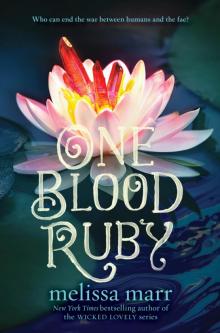 One Blood Ruby
One Blood Ruby Desert Tales
Desert Tales Faery Tales & Nightmares
Faery Tales & Nightmares Enthralled: Paranormal Diversions
Enthralled: Paranormal Diversions Wicked Lovely
Wicked Lovely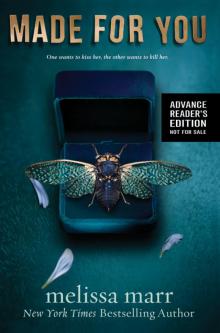 Made for You
Made for You The Maiden Thief
The Maiden Thief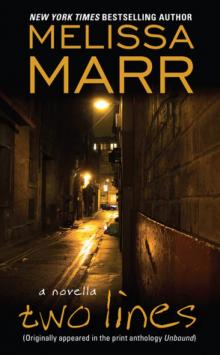 Two Lines
Two Lines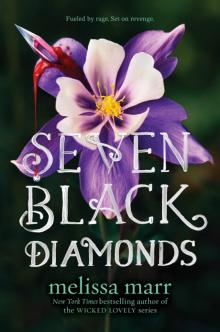 Seven Black Diamonds
Seven Black Diamonds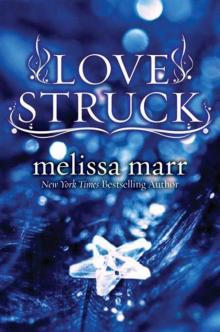 Love Struck
Love Struck Guns for the Dead
Guns for the Dead Radiant Shadows
Radiant Shadows Ink Exchange
Ink Exchange Darkest Mercy
Darkest Mercy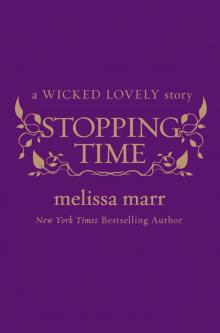 Stopping Time and Old Habits
Stopping Time and Old Habits Carnival of Secrets
Carnival of Secrets Carnival of Lies
Carnival of Lies This Fond Madness
This Fond Madness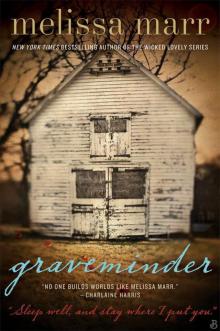 Graveminder
Graveminder The Arrivals
The Arrivals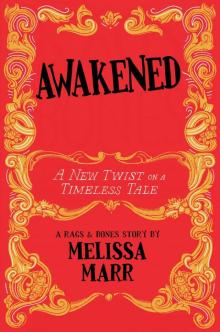 Awakened: A New Twist on a Timeless Tale
Awakened: A New Twist on a Timeless Tale Cold Iron Heart: A Wicked Lovely Novel
Cold Iron Heart: A Wicked Lovely Novel Summer Bound: A Wicked Lovely Story
Summer Bound: A Wicked Lovely Story The Wicked & The Dead (Faery Bargains Book 1)
The Wicked & The Dead (Faery Bargains Book 1)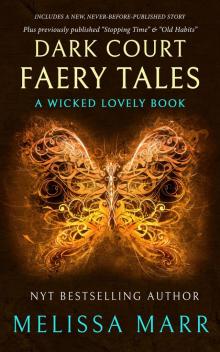 Dark Court Faery Tales
Dark Court Faery Tales of Maidens & Swords
of Maidens & Swords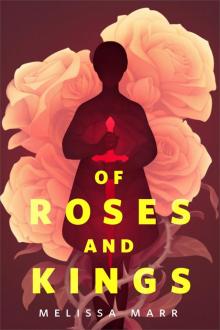 Of Roses and Kings
Of Roses and Kings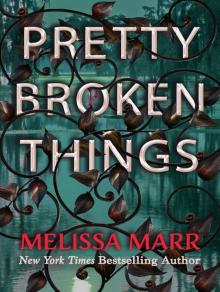 Pretty Broken Things
Pretty Broken Things Enthralled
Enthralled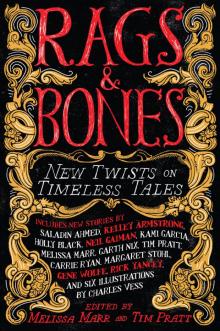 Rags & Bones
Rags & Bones Ink Exchange tf-2
Ink Exchange tf-2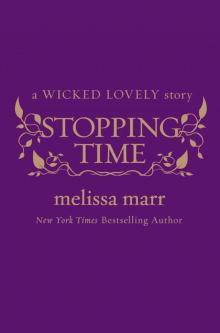 Stopping Time
Stopping Time Tales of Folk & Fey
Tales of Folk & Fey Hex on the Beach
Hex on the Beach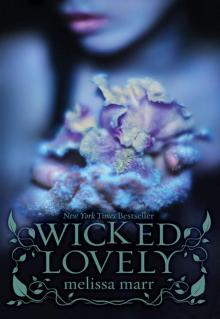 Wicked Lovely Free with Bonus Material
Wicked Lovely Free with Bonus Material Wicked Lovely tf-1
Wicked Lovely tf-1 Wicked Lovely with Bonus Material
Wicked Lovely with Bonus Material Carnival of Souls cos-1
Carnival of Souls cos-1 Radiant Shadows tf-4
Radiant Shadows tf-4 Darkest Mercy tf-5
Darkest Mercy tf-5 Carnival of Souls
Carnival of Souls Desert Tales: A Wicked Lovely Companion Novel
Desert Tales: A Wicked Lovely Companion Novel Fragile Eternity tf-3
Fragile Eternity tf-3 Old Habits
Old Habits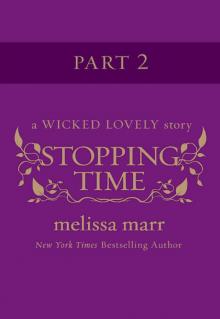 Stopping Time, Part 2
Stopping Time, Part 2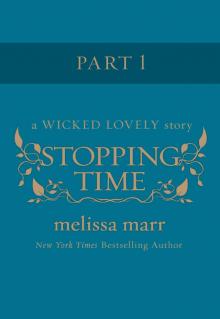 Stopping Time, Part 1
Stopping Time, Part 1